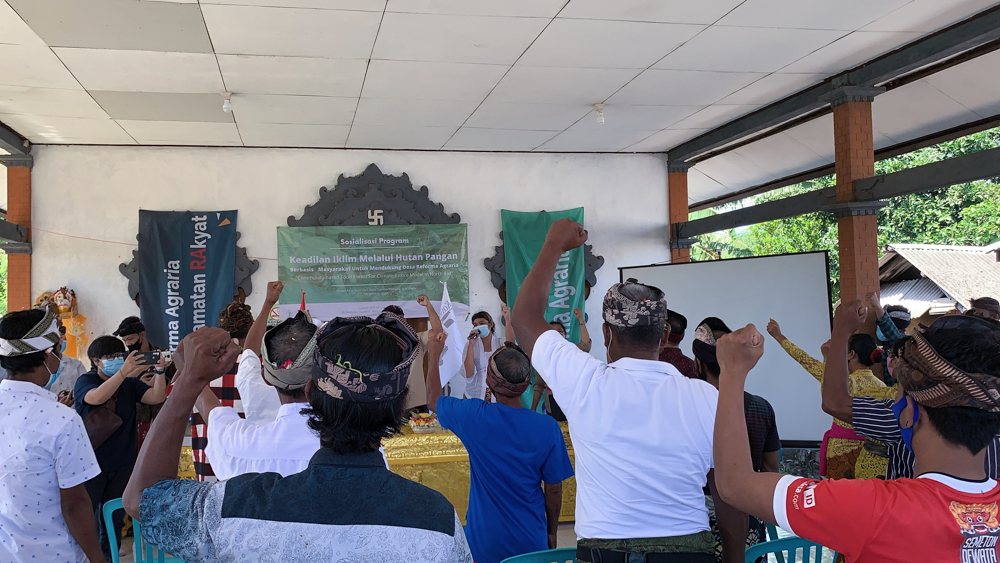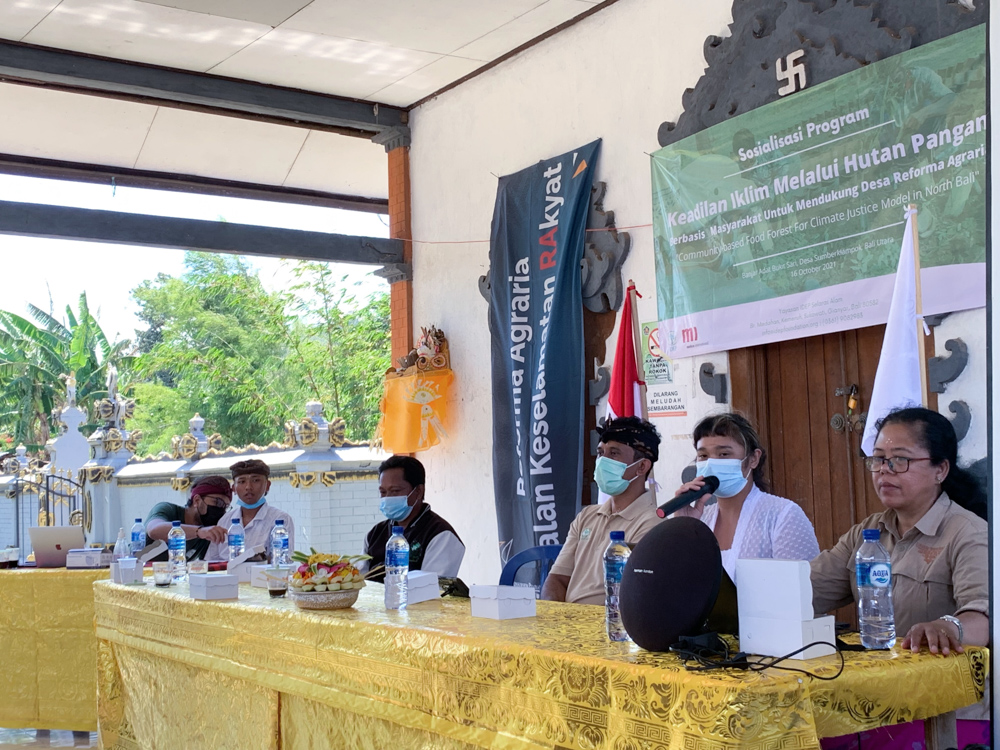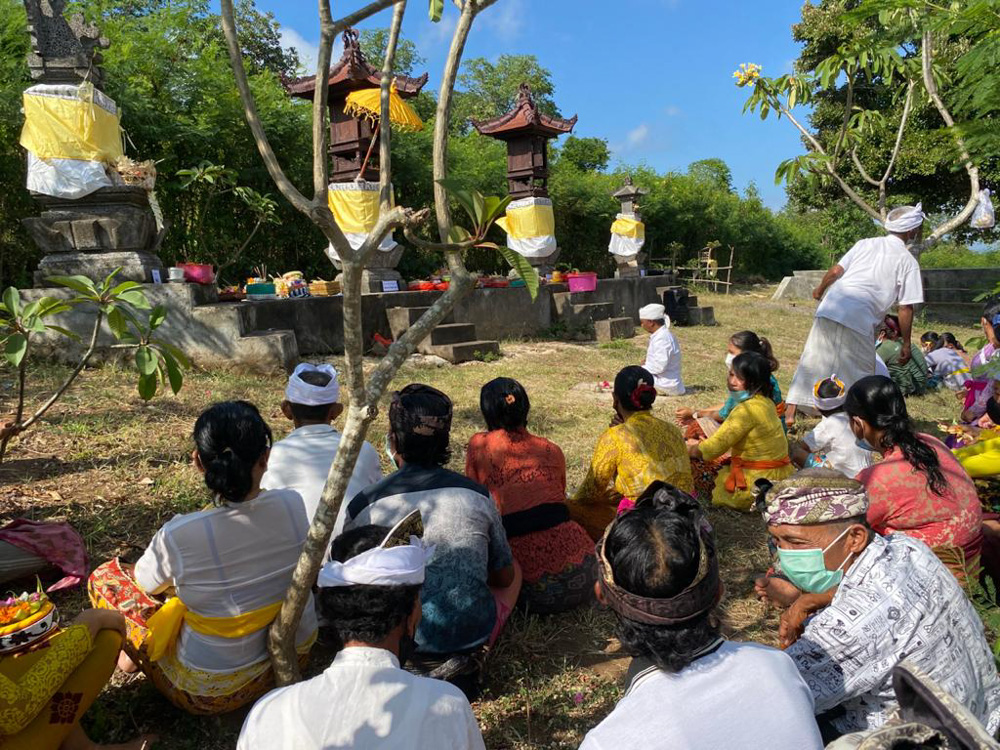Sumberklampok Farmer: Releasing Food Sovereignty Through Food Forest
Community in Bukit Sari, Sumberklampok strives for food sovereignty through the design of a Food Forest that is more nature-oriented. Amid the government narrative about a food estate, which is predicted to achieve food security by destroying around 3.69 million hectares of forest. The local community of Bukit Sari with IDEP and KPA Bali came up with a food forest built on Ayahan Subak. This collective land is included in the agrarian reform object managed by the ex-East Timor community with 136.96 hectares.

Local community, IDEP, and KPA Bali together voiced the realization of Damara and farmer sovereignty (Saturday, Oktober 16, 2021) (Photo: Gusti Diah)
The presence of the ex-East Timor refugee community to Banjar Bukit Sari, Sumberklampok Village is not without reason. They are a community of Bali who participated in the transmigration program by the government around 1984-1985. After several representatives from Bali received agricultural training in Yogyakarta, they were immediately taken to East Timor. "There, they were given land and certificates, then started farming and invited indigenous people to do farming as well," said Agus Mahadipa, a youth from Banjar Bukit Sari.
However, in 1999, after the referendum, East Timor separated from Indonesia and became Timor Leste. People who transmigrated were also brought back to their hometown, including the community from Bali. On September 10, 1999, they were picked up by the Indonesian government and had taken refuge in several places, starting from Betun, Kupang, Tamboa, until they arrived in Bali. The 'refugees' also came from various districts in Bali, such as Buleleng, Gianyar, Karangasem, and Badung. "Some families did not return home because there was no home again there and ended up staying in the refugee camp, which has now become an immigration office," said Nengah Kisid, Head of the Team (Farmers Group).
After various coordinations, until the action was carried out, finally in 2000, the refugees were brought to Sumberklampok Village and settled there. "But until now, the legality of the land we live in has not received any clarity," added Nengah Kisid.
Made Putradana, a farmer involved in the government's transmigration program, also had the same complaint. "We also have a limit of patience. The government must be responsible because this [transmigration & placement] is also a government program." The man who is also active in this farmer's group added that "This certificate of ownership is fixed. We have rights that the government must account for."
For more than 20 years, the ex-Tim Tim community has settled and managed the land that the government previously gave responsibility for the transmigration program. However, during that time, the community has not received the legality of their land rights. "We just got the Right of Use, not the Right of Ownership, even though the identity card is already here," said Agus Mahadipa, who currently leads the GM KPA (Young Generation Consortium for Agrarian Reform) Bali.
Youth Take Part in Agrarian Struggle
Around 2000, ex-East Tim Tim, who had become the community of Banjar Bukit Sari, received assistance from KPA Bali to fight for their land rights. This struggle continues to the second generation, the youth of Bukit Sari, Sumberklampok.
GM (Young Generation) KPA Bali has formed two months ago, starting with Indrawati's (KPA Bali Representative) “joke”, which five young people from Bukit Sari warmly welcomed. "When Mrs. Indra said, what if we made a GM KPA Bali, we immediately said we agreed," said Mahadipa with a laugh.
The young man, who is often called Dipa, is also aware that this struggle must continue, especially considering their parents, who have difficulty adapting to technology. Dipa began to carry out administrative work with his four friends, such as making a control letter for a plot of land almost 500 pages long to collect related data submitted to the government.
These five youths also intend to invite other youths to be involved in the movement for justice and their future. "We plan to invite our friends here to fight together," said Dipa.
They often hold meetings, both to discuss data collection and the direction of their struggle. Especially after the land certificate is given and the community gets their rights. "This [land] reflects our struggle. I hope that people will not sell their land. If they get the land, then they sell it. Same with supporting investors. We want the community to be wealthy, not to sell their land," said the 22-year-old youth.
Building a Community Resilience
The legality of the community's land rights is sought to be achieved this year. However, apart from certificates, other efforts need to be made to create community resilience. For this reason, KPA has developed the concept of Damara (Agrarian Reform Village) for approximately twenty years so that farmers can be prosperous and independent. "One of the reasons for this concept is to anticipate sale of land that has given by government to the community," Indrawati explained.

Socialization on “Climate Justice through Food Forest” Program (Photo: Gusti Diah)
Indrawati also explained some parts in the Damara concept, namely: 1) Power Management, the community owns the land in fact and juridically at the village level; 2) Land Use, land that has been used for agriculture, social facilities, public facilities, and settlements; 3) Production Management, cultivated land for production needs; 4) Consumption management, the availability of resources for production purposes, such as water; and 5) Production Management, production post-harvest products.
However, in realizing this Damara, according to Indrawati, KPA requires partners with a harmonious vision. "We need IDEP, which will later play a role in realizing production and consumption parts," she explained.
Both organizations will also share roles to create the sovereignty of Bukit Sari community. KPA Bali will focus on legal and policy advocacy. Meanwhile, IDEP will increase community capacity in terms of agriculture, economy, and disaster mitigation. "Our presence here wants to try to realize our goals through sustainable living, namely permaculture," said Putu Bawa from IDEP.
Together with local community, they will develop and define five zones within the food forest. Then create nurseries, home gardens, waste management, composting, water filters, and post-harvest production. This development is also accompanied by various training related to sustainable agriculture. "Hopefully, we can maximize the abundant potential here. We also from IDEP will learn a lot from the local community. We will complement each other," added Putu Bawa.
Food Forest in Harmony with Nature
The community has well received the food forest development plan. Moreover, this plan was socialized to coincide with International Food Day and Tumpek Pengatag Day (Day of Plant) for the local community. The event began with prayers at the Subak Merta Sari Temple, Banjar Bukit Sari.

Praying at Subak Temple in commemoration of the Tumpek Pengatag (Photo: Kadek Widiastawan)
The program socialization is perceived as a form of alignment between Sekala (Seen) and Niskala (Unseen). "This Food Forest is closely related to Tri Hita Karana, how we establish a harmonious relationship with God, nature, and others," said the Kelian Adat of Sumberklampok Village.
There was also a good response from the Banjar Bukit Sari youth group, who understood the importance of food sovereignty, especially during pandemic like today. International Food Day is not only ceremonial but the Sumberklampok farmer's first step in becoming food and social sovereignty. "This food forest is very important because food is essential, so later we will not always depend on buying food but can produce here," explained Dipa.(Gd)
Subscribe to IDEP Newsletters
Give a gift that will change lives. 100% funds charity projects.
|






